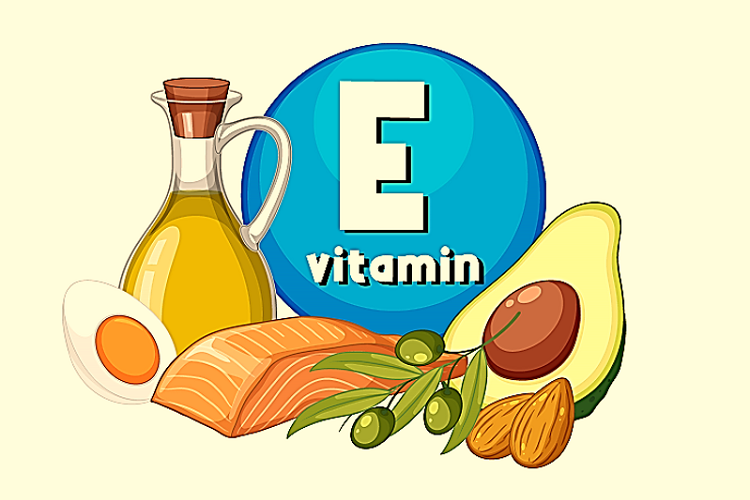Certain vitamins stand out for their remarkable contributions to health and well-being. One such vitamin is vitamin E, renowned for its antioxidant properties and numerous health benefits. But what exactly is vitamin E, and how does it support our bodies? In this comprehensive guide, we will explore the uses, dosage recommendations, and benefits of vitamin E, including its role in promoting skin health, supporting the immune system, and protecting eye health.
What is Vitamin E?
Vitamin E plays a crucial role in numerous physiological functions within the body. It supports immune function, helps maintain healthy eyes and skin, and acts as a potent antioxidant to protect against oxidative stress. It is essential for overall health and well-being, and obtaining an adequate intake is vital for optimal functioning of the body.
Health Benefits of Vitamin E in the Human Body
- Powerful Antioxidant Protection: It acts as a powerful antioxidant, helping to neutralize free radicals and protect cells from oxidative damage.
- Heart Health: This may support heart health by helping to prevent the oxidation of bad cholesterol. Oxidized bad cholesterol can contribute to the development of atherosclerosis, a condition characterized by the buildup of plaque in the arteries. By reducing bad oxidation, it may help lower the risk of heart disease and stroke.
- Skin and Hair Health: It is often a key ingredient in skincare and haircare products because it moisturizes and acts as an antioxidant, protecting both skin and hair from damage caused by the sun, pollution, and other environmental factors. It’s like a multivitamin for hair, helping wounds heal faster, soothing inflammation, and enhancing the overall appearance and texture of skin and hair.
- Immune Support: It plays a role in supporting immune function by enhancing the activity of immune cells and promoting the production of antibodies. Adequate vitamin E intake may help strengthen the immune system and reduce the risk of infections and diseases.
- Eye Health: It is beneficial for eye health, particularly in preventing age-related macular degeneration (AMD) and cataracts. As an antioxidant, it helps protect the cells of the eyes from oxidative damage caused by exposure to UV radiation and free radicals.
- Anti-inflammatory Effects: It possesses anti-inflammatory properties, which may help reduce inflammation throughout the body. Chronic inflammation is linked to various health conditions, including arthritis, diabetes, and Alzheimer’s disease. By mitigating inflammation, it may help alleviate symptoms and improve overall health.
Signs of Vitamin E Deficiency
Vitamin E deficiency can lead to health issues due to its essential role in the body. Here are some common symptoms of deficiency:
Vision Problems
It is involved in maintaining eye health, and deficiency may contribute to:
- Blurred vision
- Retinal degeneration
- Difficulty seeing in low-light conditions
Immune System Weakness
Vitamin E plays a role in supporting immune function, so deficiency may result in:
- Increased susceptibility to infections
- Slow wound healing
- Compromised immune response
Skin Issues
It is important for skin health, and deficiency may lead to:
- Dry, flaky skin
- Premature aging, including wrinkles and fine lines
- Increased susceptibility to sun damage
Anemia
Although less common, severe vitamin E deficiency can contribute to hemolytic anemia, a condition characterized by:
- Fatigue and weakness
- Shortness of breath
- Rapid heart rate
- Pale skin
Increased Free Radical Damage
It is a powerful antioxidant that helps protect cells from oxidative stress. Deficiency may lead to increased free radical damage, contributing to chronic inflammation and various health issues.
Top Sources Containing Vitamin E
- Nuts and Seeds: Almonds, sunflower seeds, hazelnuts, and peanuts are excellent sources.
- Vegetable Oils: Wheat germ oil, sunflower oil, safflower oil, and olive oil are rich in vitamin E.
- Multivitamin Supplements: Multivitamin supplements often contain vitamin E as part of their formulation, providing a convenient way to ensure adequate intake of this essential nutrient.
- Green Leafy Vegetables: Spinach, kale, and Swiss chard contain moderate amounts of vitamin E.
- Avocado: Avocado is a nutrient-dense fruit that provides vitamin E along with healthy fats.
- Fortified Foods: Some breakfast cereals, fruit juices, and margarine are fortified with this vitamin.
Incorporating these vitamin-rich foods into your diet or taking multivitamin capsules can help you meet your daily needs and support overall health and well-being.
Conclusion
Vitamin E stands as a crucial nutrient offering manifold health benefits, from bolstering antioxidant defenses to supporting immune function and promoting skin and hair health. For those facing challenges in meeting their vitamin requirements through diet alone, multivitamin capsules like Becosules can serve as a convenient and effective solution. By embracing the potency of vitamin E, you pave the way for optimized health and vitality.












